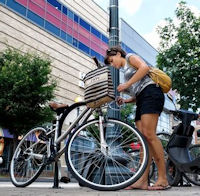by James A. Bacon
City planners in the District of Columbia want to waive parking requirements for new buildings near its 40 Metro stations. A change in the city’s zoning code, part of a comprehensive overhaul, would allow developers to determine how much parking, if any, was needed, reports the Wall Street Journal.
Relaxation of the parking mandates in D.C. is but one instance of cities around the country trying to reduce dependence upon automobile-related transportation. Sparing developers the expense of providing structured parking accomplishes two goals. First, reduces the cost of real estate, which percolates down to citizens in the form of lower rents. And second, it allows parking prices to rise, inducing some households to own fewer cars — or none at all.
In the case of Washington, D.C., the district now has a larger percentage of households without cars than any U.S. city besides New York City. In 2011, the number of car-free households was nearly 37% — way up from 25% in 1960. The shift to transit and biking has reduced the need for cars and parking. But the city has been slow to react. In 2008, according to the Journal, the city spent $47 million to build a 1,000-space parking garage under the new DC USA shopping center. At the developer’s request, that was half of what the zoning code would have required. Even so, the 1,000 spaces were far more than needed. As it turned out, many shoppers rode the Metro to the mall.
Other cities to roll back parking mandates in recent years include Denver, Philadelphia and New York City. However, Portland, a leader in the shift to transit and biking, has recently backtracked on its previous minimum parking requirements due to a perceived scarcity of parking spots.
Bacon’s bottom line: I see no justification for parking mandates whatsoever. Developers should be free to build or not build parking structures as market conditions dictate. If a neighborhood experiences a parking shortage, developers will be motivated to add structured parking to their projects. If they don’t respond, parking lot operators will be motivated to build. If parking remains scarce, neighborhood residents will motivated to dispense with their cars.
I well remember living in Baltimore while attending the Homewood campus of the Johns Hopkins University. I lived in a 10th-floor efficiency across the street from campus, but my apartment had no parking. I drove my car around and around looking for a free, on-street place to park. Sometimes, I’d have to settle for a location three or four blocks away. Then I’d forget where I’d left the car! Parking became such a hassle that I sold the darn thing. As it turned out, I discovered that I didn’t need a car anyway. Grocery stores, banks and other basic services were within walking distance. When I had to leave town, I took Trailways.
I see no more justification for mandating or subsidizing parking than I see in mandating or subsidizing automobile ownership, mass transit or any other transportation mode. The market will reach a reasonable equilibrium based upon the relative costs of transportation alternatives and people’s changing preferences, making continual incremental adjustments that never get too far out of whack. (If new dynamic pricing strategies are adapted for on-street parking, the market could become even more efficient.) By contrast, parking requirements embedded in musty old zoning codes are far slower to adapt to changing supply and demand conditions, with the result that far bigger, more disruptive imbalances result.
One last note: The outlawing of parking mandates should not apply only to dense urban areas. Market forces should prevail everywhere, including low-density suburbs. A lot of people accustomed to “free” parking — i.e., parking paid for by someone else — will howl. But the net result will be positive.



